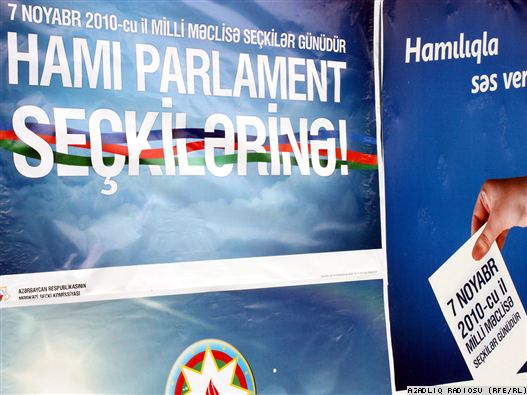
Parties Divided in Azerbaijani Parliamentary Elections
Publication: Eurasia Daily Monitor Volume: 7 Issue: 200
By:

Azerbaijan’s upcoming parliamentary elections on November 7 are unlikely to change the distribution of power within the country. As with the previous election to the highest legislative body in 2005, this time pundits are observing a divided opposition, confident ruling party and dozens of independents, trying their chance with little support base.
According to official data from the Central Election Commission, among the 734 registered candidates, more than half (378) represent 33 political parties. In fact, 330 candidates have called themselves independents and the remaining 26 did not indicate any political party affiliation (www.cec.gov.az). Such a diverse and colorful range of candidates is very striking, because Azerbaijan is a relatively small country. The electoral system in the country experienced a major change in 2002, when the proportional (party list based) system of election was abolished and only a majority (single district or single mandate) system remained. It was expected that the change would consolidate the small political parties in the country and create a few large political parties able to compete at the national level. Almost all countries with a majority system of elections, such as the US, UK, and Germany have undergone this transformation (Azertaj News Agency, October 25).
Political parties in Azerbaijan, however, not only decreased in numbers, but continued to divide and fragment. This fragmentation hinders the chances of the opposition gaining a significant victory in the national elections, as they cannot unite their resources and tactics. In this coming election, major opposition parties have again decided to run in separate blocks. Musavat and the Popular Front parties have united in one block, called “AXCP-Musavat block,” while Popular Front’s former partners (Liberal Party and Civil Development Party) have decided to stay out of this block and formed their own. The Classical Popular Front party, usually running in tandem with Musavat, has also opted to stay alone. The National Independence Party is as always running its own campaign without joining forces with any other opposition party. A total of 14 blocks have been created by political parties in the country, thus once again showing and reinforcing the seriousness of the fragmentation problem among the political parties in the country (Azertaj News Agency, October 29).
It is interesting to note, that even the most popular and strongest opposition parties in the country, such as Musavat and Popular Front, have nominated in total only 37 candidates, thus covering only one third of all single mandate districts, and most of them are running in Baku and a few other major cities. Such a small number of nominated party members show the weak representation of the opposition parties in the distant and remote regions of Azerbaijan.
Opposition parties are divided not only in terms of candidates, but they also lack a unified message, campaign tactics and strategy. They talk about different issues on free public TV airtime, which is allocated to the candidates for addressing their voters. Some candidates raise the issue of the Karabakh conflict; others talk about the mismanagement of oil funds and lack of democracy. Inconsistency in their message and lack of focus on real, district-based problems disappoints the voters. Opposition parties rarely exchange or help each other with resources, either financial or human. They are very suspicious of each other and often use black propaganda to discredit one another. In a way, they are competing not with the ruling party but with each other for the favor of the government (www.day.az, October, 27).
The ruling Yeni Azerbaijani Party (YAP), on the other hand, has not lost its confidence and has nominated 111 candidates in this election. Indeed, 24 members of YAP are also running on their own initiative, without the party list. The central office of the party provides support to the candidates, nominated by the party. However, the main burden of funding and running an electoral campaign falls on the shoulders of the candidates themselves (www.day.az, October 27).
As the GDP of the country has risen annually by double digit numbers and the budget of the country has skyrocketed to almost $15 billion, it is unlikely that the voters will demand significant changes. Most of the opposition candidates are either running a hopeless campaign without much resources or hoping that they will be luckier than other opposition parties to be elected to parliament under some sort of international pressure or ad hoc state support. None of the opposition parties expect or will even try to make substantial changes to the governance system of the country. The Musavat party has been represented in the outgoing parliament by several MP’s and now other opposition parties are trying to capture that niche as well.




